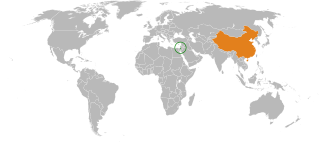
Though the Ministry of Foreign Affairs (MOFA) is the government agency which is responsible for conducting the foreign relations of Nepal, historically, it is the Office of the Prime Minister (PMO) which has exercised the authority to formulate the country's foreign policies. As a landlocked country wedged between two larger and far stronger powers, Nepal has tried to maintain good relations with both of its neighbors, People's Republic of China and Republic of India. However, the relationship between Nepal and India was significantly hampered by the 2015 Nepal blockade when the Government of Nepal accused India of mimicking "Russia-Ukraine" tactics by using ethnically Indian residents of Nepal to cause unrest along Nepal's southern border. India denied the allegation and said the unrest were an internal affair. For the most part though, Nepal has traditionally maintained a non-aligned policy and enjoys friendly relations with its neighboring countries and almost all the major countries of the world.

Matan Vilnai is an Israeli politician and a former major general in the Israel Defense Forces (IDF). A former Knesset member and government minister, he was appointed ambassador to China in 2012. Since 2017 Vilnai serves as the president of the Israel-Asia Chamber of Commerce.

The People's Republic of China (PRC) and the State of Israel formally established diplomatic relations in 1992. While the Republic of China had de jure recognized Israeli sovereignty in 1949, it eventually lost the Chinese Civil War, bringing the Chinese Communist Party (CCP) to power across mainland China. In 1950, Israel became the first country in the Middle East to recognize the PRC as the sole government of China, but the CCP did not reciprocate by establishing diplomatic ties due to Israel's alignment with the Western Bloc during the Cold War. This discontent persisted until the Cold War came to a close with the dissolution of the Soviet Union in 1991.

The Israeli Ministry of Foreign Affairs is one of the most important ministries in the Israeli government. The ministry's role is to implement Israel's foreign policy, and promote economic, cultural, and scientific relations with other countries.

Hungary–Israel relations are the foreign relations between Hungary and Israel. Hungary has an embassy in Tel Aviv and 4 honorary consulates. Israel has an embassy in Budapest and an honorary consulate in Szeged.

Georgia–Israel relations are diplomatic, commercial and cultural ties between Georgia and Israel. Diplomatic relations were formally established on June 1, 1992, alongside establishing diplomatic relations with the US. Georgia has an embassy in Tel Aviv and a consulate in Jerusalem. Israel has an embassy in Tbilisi.

The Embassy of the People's Republic of China in Ukraine is the diplomatic mission of the People's Republic of China in Ukraine.
Zev Sufott was an Israeli diplomat who served as Israel's first Ambassador to the People's Republic of China, beginning in 1992. Born and raised in the United Kingdom, he was also a former Israeli Ambassador to the Netherlands and the Deputy Director for Europe within the Ministry of Foreign Affairs.

Reuven Merhav, is an Israeli diplomat, intelligence official and an expert on Islam and the Middle East.

The Permanent General Mission of Palestine in Tokyo is the de facto embassy of Palestine in Japan. There is no official diplomatic relations between the two nations as Japan doesn't recognize Palestine as a sovereign state. Even though the Japanese government supports a two-state solution, the status quo over diplomatic relations persisted over the years with periodic state visits between the two nations. Japan operates a representative office in Ramallah.

The Embassy of the State of Palestine in Iran is the diplomatic mission of the Palestine to Iran, located in Palestine Street in Tehran. This mission was initially managed by the Palestine Liberation Organization and currently by the State of Palestine.

The Embassy of Mexico in China, based out of Beijing, is the primary diplomatic mission from the United Mexican States to the People's Republic of China.

Equatorial Guinea–Israel relations are the bilateral relations between Equatorial Guinea and Israel. The Israeli embassy in Yaounde, Cameroon, is accredited to Equatorial Guinea. Equatorial Guinea has a resident embassy in Israel, which opened in 2019 and located in Herzliya.

Irit Ben-Abba Vitali is the current Israeli ambassador to China and non-resident ambassador to Mongolia since 2021.
Embassy of Russia in Tel Aviv is the official diplomatic mission of the Russian Federation in the State of Israel. The embassy was originally opened in 1948, was temporarily closed between 1967 and 1991, and has since been reopened and is currently functioning.

The Embassy of the People's Republic of China in the State of Israel is the official diplomatic mission of the People's Republic of China to the State of Israel, located in Tel Aviv. The embassy was opened in 1992, and the current ambassador is Run Cai.















